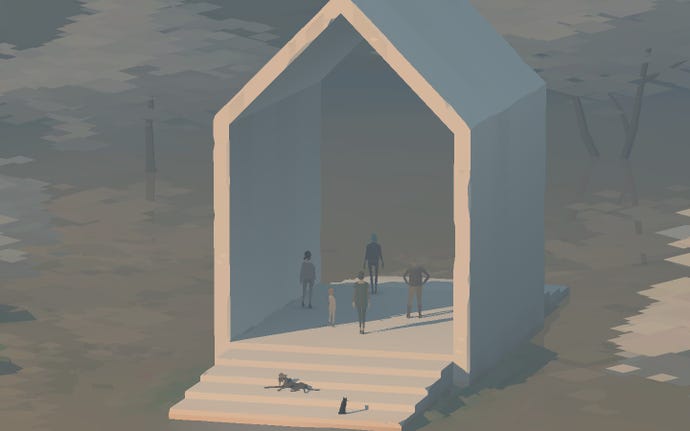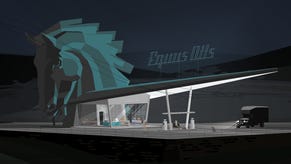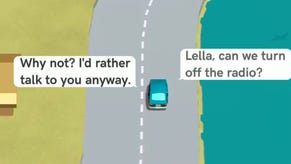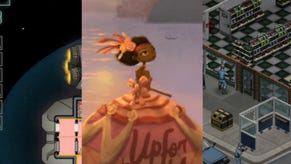Kentucky Route Zero Review: Hard Times Served
Delivering a new kind of American Dream.
This article first appeared on USgamer, a partner publication of VG247. Some content, such as this article, has been migrated to VG247 for posterity after USgamer's closure - but it has not been edited or further vetted by the VG247 team.
I remember when the Hamburger Helper turned into Tuna Helper. It was when I knew the bills were coming up, so my mom had to tighten the belt. I remember the times she and her partner got laid off from their respective jobs. Like clockwork, the Hamburger Helper would give way to Tuna Helper.
Kentucky Route Zero is a game acutely aware of the compromises that everyday Americans constantly make to survive and provide for their loved ones. It's a game made as a direct answer to the Great Recession of 2008 that unceremoniously destroyed the economy and whatever was left of "the American Dream," leaving middle-to-lower class people to suffer in its wake. It's a place where the people who work the hardest are paid the least, and struggle the absolute most. One nation, under debt.
Kentucky Route Zero is a point-and-click adventure game, in the traditional way of the genre. You point and click where characters move, and answer dialogue in turn. Unlike most classics of the genre, there is no inventory. You follow a set group of characters through it all. It has a bleak Southern Gothic tone that's married with magical realism by way of Haruki Murakami. It started back in 2011 with a Kickstarter. In 2013, Acts 1 and 2 released within months of each other. Act 3 followed in 2014; Act 4 in 2016, and now, after a long delay, we're finally at Act 5.
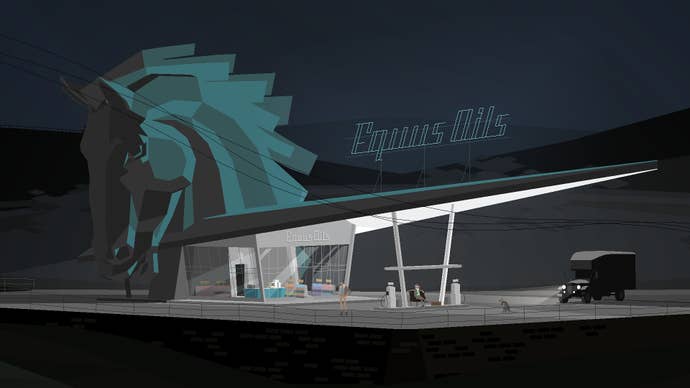
A lot has changed since 2016. Launching the PC version that includes Act 5, I found myself greeted by new font work, as well as a far busier menu screen. The free interludes that were previously only available via Kentucky Route Zero's website are now included in the main package. The menu, previously a black screen with some plain text links, now acts as an intricate compass that you rotate around. Kentucky Route Zero has stepped up its presentation, and it feels like a fuller game than before as a result.
The acts themselves are divided up by "scenes" that play out like a stage play. Every scene has its own little story, its own makeshift set. You're never occupying these characters; you're dictating what's on their mind in the moment to moment. I named an old dog Blue, and that's how she always was to me: old, tired Blue. When the young kid Ezra is presented with dialogue where he talks about missing his parents or shrugging their disappearance off, I chose the former. I felt closer to Kentucky Route Zero's characters because of the interior-facing decisions. The lack of narrative-changing choices along the journey isn't a fault. It's a strength.
We've seen the shape of Kentucky Route Zero dozens of times in just the past decade. The low-poly art design has been the basis for many other indie games; the midwestern setting has appeared in the likes of Night in the Woods. But what makes Kentucky Route Zero stand out in the crowd is how it plunges head on into what feels like uncharted territory. It's the most poetic game I've ever played in the way that it balances relatable issues with magical, dreamlike circumstance.
Its prose is the best I've seen in any adventure game. Nothing ever feels out of place. You don't blink when, in Act 1, the main pair of characters discovers that there is a secret highway called The Zero lying underneath all of Kentucky. You never question people being tricked into trading in their monetary debt for indentured servitude at an underground whiskey distillery run by neon skeletons either. It all rings as equally true and meaningful, like a poem. The epilogue is even named after a work by Robert Frost.
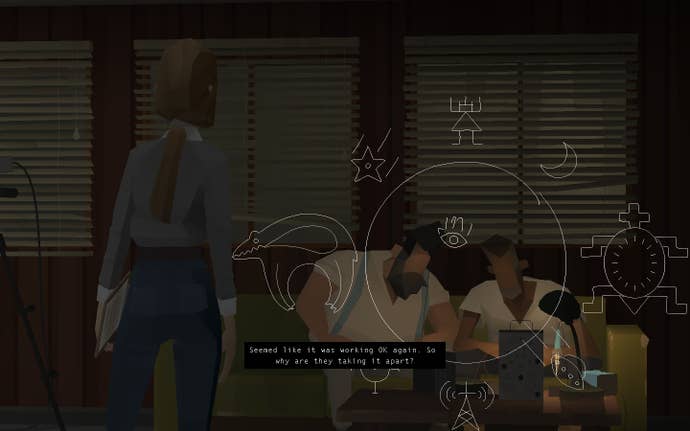
Throughout its near-decade long stretch, Kentucky Route Zero has followed an unlikely band of characters, all tethered together by a word no one really utters: homelessness. There's the main characters, Conway and Shannon. Conway is an aged soul making one last delivery for a small antique shop that's closing down. He has a dog who moves about as sluggishly as he does. The address he's delivering to? It doesn't exist, seemingly. Until it does. Then there's Shannon, who is younger but hardened by her own tragedies. Her parents, once mine workers, died in a flood. She fixes TVs for a living, or used to before the lease on her workshop was suspended. The first thing she asks Conway, if you direct her to, is: "Do you believe in ghosts?" She tags along with Conway on his journey because, well, what else can she do?
From there, the party blossoms. There's Ezra, the abandoned boy who claims a giant eagle is his brother. There's Clara, the captain of a rickety ship carrying a giant mechanical mammoth. There's Junebug and Johnny, the robot musicians that drift from venue to venue with nowhere to call home. And that's just to name a few. They're people who are doing their best, happy or not, with the hand life has dealt them. Previously, they were divided by homelessness, but the same circumstance brings them together. They form a makeshift family. Even the characters you meet in passing leave an impression.
They have another thing in common too: They're all colored by debt. In just the first scene, you read about how a gas station owner's power keeps getting shut off because they can't afford to pay their bills. In the interlude "The Entertainment," a bartender apologizes as he tells customers who never paid their tab that in order to stay in business, he traded their debt away to the eerie Hard Times distillery. They'll now work the rest of their days away there, and it wasn't even their choice. Such is the fate that seemingly everyone is doomed to one day, to be overcome by debt in one way or another.
Part of what makes Kentucky Route Zero all the more special is how you're never any one character. The text you read is always written in third-person, giving you distance, always. As the journey goes on, your control of Conway dwindles. By Act 5, you're a bystander.
There are technical moments that stand out just as much as its narrative peaks. When exploring the mines in Act 1, Conway and Shannon find themselves in a roundabout of sorts from the minecart they're riding on. They change the track the minecart is headed, and suddenly, the game's camera unexpectedly swirls around, casting aside the side-scrolling or single-screens we'd grown accustomed to. It's striking to discover that, throughout each act, Cardboard Computer finds new ways to lay out and frame its scenes, even if it's just as simple as careening the camera.
It's an adventure game that never settles, either. It's constantly shifting how it approaches scenes—from framing, to lighting, to how you navigate it. I won't soon forget Junebug crooning the lyrics that you, the player, determine during a live performance that turns ethereal; where the roof actually flies away as if to make more room for Junebug and Johnny's song in the dingy Lower Depths bar. Or when the group explores the rich history of text adventures as the world around them devolves into a vector-graphic text adventure.
It's the sort of game where everyone I've talked to about it remembers something different. Where every player has a standout moment that resonates. For me, it's a scene that reflects everything fantastic about Kentucky Route Zero: its rich characterizations, its melancholic tone, its surreal quality.
It's in Act 4. Meandering at a diner after a big event, the crew observes a half-eaten, perfectly preserved meal sitting at a nearby table. It's been preserved for 15 years, thanks to shellac. It's the leftovers of a meal eaten by two local divers who were so hungry, they allegedly ordered the entire menu without even looking. And then some. One of the restaurant's owners, Ida, tells the crew that in those days the menu was short. Most of their food was frozen, unlike now. Then, according to Ida, her husband Sam burst in and cried, "These divers are still hungry! Bring them another course!" From there on, Ida kept cooking, making up courses on the fly. To preserve her creativity in that one, frantic night, she's left the food preserved. Since then, their restaurant had suddenly become popular.
Only Sam remembers the evening quite differently.

According to Sam, he quietly slipped into the kitchen just as Ida was about to write up their check, and told her to just keep sending out food. He just wanted to listen to the divers talk, so he could learn where they dived and bring fresh fish back to their establishment. "It was like a dance—no, like a boxing match. Each story went deeper than the last," Sam says. "And I listened to every word of it, memorized every description of every tunnel and diving route they'd discovered. That's my map now, you see?" Afraid of writing it down, he'd kept the food preserved so that he could efficiently jog his memory.
It's those small, immediately memorable moments that make Kentucky Route Zero feel truly singular in not just adventure games, but video games. It's the only game, at least of its stature, that's approached American issues in an unapologetically American way. Where it's cynical, but in equal measure tender. Honest but also, hopeful.
Kentucky Route Zero, the almost-decade-in-the-making game, has perhaps showed most that debt is omnipresent, recession or not. It's poetic in how it unites everyone, but dehumanizes people all the same. Playing through the game's acts all over again, I've thought back on my own family's hardships, and how despite debt, layoffs, unemployment, those not-great Tuna Helper dinners, and everything else thrown at us, we persevered through it all somehow, just like the unlikely family in Kentucky Route Zero. If only everyone else could be so lucky. At least, Kentucky Route Zero shines through its own cynicism, unmasking that maybe we all can pave the way toward a new kind of American Dream. One, y'know, where we're not in indentured servitude for life in one way or another.
ConclusionMelancholic, all too real, but in the end, hopeful, Kentucky Route Zero is a reflection of what it's like to survive as an everyday American. It's an adventure concerned not just with our country's endemic issues, but with the people at the center and their undying perseverance in the face of economic cruelty. As an adventure game, it is perhaps one of the finest games ever written, ebbing and flowing between the perspectives of not just other characters, but the lens we see it through. All considered as the sum of its many, equally magnificent parts, Kentucky Route Zero is a game I won't forget for a long, long time.
